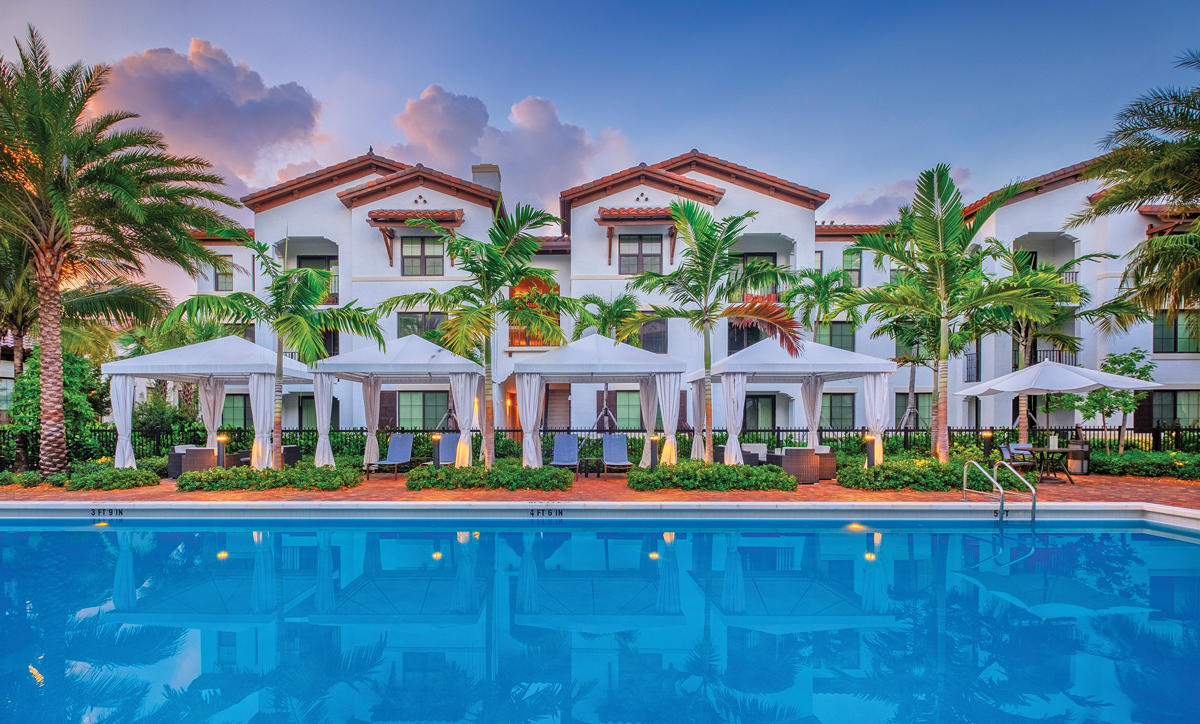Trending
Out-of-state multifamily buyers eye South Florida
South Florida’s multifamily market starts new year buoyed by out-of-state interest

When JLL’s Maurice Habif brought a 336-unit Hollywood apartment complex to market just before Labor Day, he noticed more than the regular crop of institutional investors active in South Florida paying attention.
Habif saw unfamiliar private investors, family offices from outside Florida, even a group financed by 1031 exchange deferred capital gains money.
The Parc Station complex, a garden-style apartment community at 2301 North 29th Avenue, eventually sold to Atlanta-based Cortland Partners for $91.7 million, marking the private investor’s third deal in the past 18 months. But the increased interest in the region from a newer crop of investors helped drive up bids.
That appetite for Florida multifamily assets has brokers anticipating a deluge of deals in 2021. Multifamily investors, sensing that bargains were at hand, rushed into the market, while landlords, hoping that rent collections would stabilize, held onto assets, South Florida brokers said.
The gridlock resulted in a slowdown by some measures. Market-rate multifamily sales above $25 million in Palm Beach, Broward and Miami-Dade counties dropped from 39 sales in 2019 to 31 sales in 2020, said Hampton Beebe, a vice chairman out of Newmark’s Boca Raton office.
Yet a flurry of deals at the end of the year were a promising sign of what’s to come. Dollar volume of $20 million-plus sales in South Florida was $2.8 billion in 2020, up 17 percent year-over-year from $2.4 billion, according to JLL.
And despite a spike in unemployment — Miami Beach-Kendall metropolitan area’s unemployment rate rose to 7 percent in December 2020 from 1.5 percent in January 2020, according to the U.S. Bureau of Labor Statistics — landlords did not see rents drop. Apartment rents for the Miami metropolitan area stayed flat year-over-year — a 0.2 percent growth from December 2019 to December 2020, according to Yardi.
Meanwhile, the buyer pool in South Florida’s multifamily market could be changing. Real estate investment trusts accounted for just 3.2 percent of multifamily deals in 2020 compared to 12.8 percent the year prior, according to Brandon Isner, a Miami-based researcher at CBRE.
 Private buyers’ share of apartment investment sales fell to 45.2 percent last year from 47.5 percent in 2019, Isner said. And institutional investors took on a far bigger share of deals, accounting for 46.3 percent of transactions in 2020 compared to 32 percent in 2019.
Private buyers’ share of apartment investment sales fell to 45.2 percent last year from 47.5 percent in 2019, Isner said. And institutional investors took on a far bigger share of deals, accounting for 46.3 percent of transactions in 2020 compared to 32 percent in 2019.
Those changes were in contrast to nationwide trends. Across the U.S., private capital accounted for 66.6 percent of 2020 deals compared to 64.9 percent in 2019, while institutional capital’s share rose to 24.6 percent in 2020, up from 22 percent in 2019.
South Florida multifamily cap rates remained unchanged last year, despite Covid-19, with rates at about 4.5 percent in the summer of 2020, similar to cap rates in the second half of 2019, CBRE data show.
Those rates put South Florida in line with such places as Los Angeles, Atlanta and Chicago. South Florida multifamily cap rates were below the 5.8 percent rate of New York City and the 5.3 percent high of Orlando and Philadelphia, according to CBRE.
More interest in South Florida means cap rates will compress further. Beebe said his team is already seeing that in the first quarter of this year.
Private and institutional investors that bet on bigger assets are looking to hold them for up to 10 years, and South Florida’s rebound after the Great Recession has been a selling point.
“Miami is always underestimated for recovery,” Beebe said.
Collections for South Florida Class A multifamily assets are above 95 percent, with Miami-Dade lagging Broward — and Broward lagging Palm Beach County. Class B and C assets are still above 90 percent, according to Cushman & Wakefield data.
The region’s perceived stability is why Yamal Yidios’ Miami-based real estate company, Ytech, didn’t accept lesser offers for Ocean House, a 186-unit garden-style multifamily property at 7780-7810 Tatum Waterway Drive in Miami Beach’s North Beach area. Ytech listed the property for $50 million in the summer, and Yidios is content to hold out for that price. “When the timing is right, we will sell Ocean House,” he said.
In December, Ytech sold a 491-unit multifamily complex in Miami Gardens to private investor Greenstone Property Group for $78 million. Ytech bought the property for $14.4 million in 2012.
Sellers and their brokers say out-of-state buyers are clearly showing more interest. Yidios said that among the 460 confidentiality agreements he received for Ocean House in Miami Beach, 35 percent came from the New York or Los Angeles area.
Joseph Thomas and his team at Marcus & Millichap usually work with properties between 10 and 200 units that don’t typically capture institutional interest. The more stabilized properties see cap rates of 5 percent or higher, he said.
Although market conditions such as Covid-19 can push landlords to sell, personal circumstances are usually the catalyst, Thomas said. Maybe a landlord is ready for retirement. Maybe his or her family doesn’t want to take over the business. Maybe a loan is coming due.
In South Florida, 210 properties of between eight and 100 units sold in 2020, down 19 percent from 258 deals in 2019, Thomas said.
At the same time, he said that out-of-state inquiries doubled from 2019 — 25 percent of 2019 inquiries came from out of state compared to half of 2020’s. Other states’ shutdowns, high state and local taxes, and rent controls have driven up demand in Florida and other low-tax states.
“March and April were relatively slow and scary,” Thomas said. “Then investors started to re-emerge. Collections came in better than originally anticipated. Business started to pick up in May, and we’ve never looked back.”




